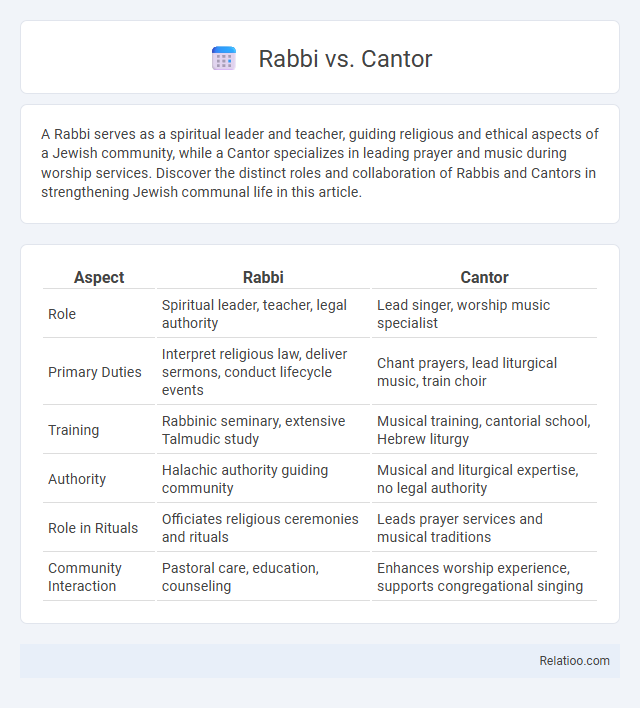A Rabbi serves as a spiritual leader and teacher, guiding religious and ethical aspects of a Jewish community, while a Cantor specializes in leading prayer and music during worship services. Discover the distinct roles and collaboration of Rabbis and Cantors in strengthening Jewish communal life in this article.
Table of Comparison
| Aspect | Rabbi | Cantor |
|---|---|---|
| Role | Spiritual leader, teacher, legal authority | Lead singer, worship music specialist |
| Primary Duties | Interpret religious law, deliver sermons, conduct lifecycle events | Chant prayers, lead liturgical music, train choir |
| Training | Rabbinic seminary, extensive Talmudic study | Musical training, cantorial school, Hebrew liturgy |
| Authority | Halachic authority guiding community | Musical and liturgical expertise, no legal authority |
| Role in Rituals | Officiates religious ceremonies and rituals | Leads prayer services and musical traditions |
| Community Interaction | Pastoral care, education, counseling | Enhances worship experience, supports congregational singing |
Introduction: Distinguishing Rabbi and Cantor
A Rabbi serves as a spiritual leader and teacher within the Jewish community, responsible for guiding religious practices, interpreting Jewish law, and officiating at life cycle events. A Cantor, known as a Hazzan, specializes in leading congregational singing, chanting prayers, and enhancing worship through musical liturgy. Unlike Rabbis and Cantors, Officiants may be secular or interfaith leaders who conduct ceremonies without specific religious training, catering to diverse spiritual or cultural needs.
Historical Roles in Jewish Tradition
Historically, rabbis have served as scholarly teachers and interpreters of Jewish law, guiding communities through religious study and legal decisions. Cantors, or chazzans, assumed the role of spiritual leaders in prayer, using their vocal skills to lead synagogue services and enhance worship experiences. Your understanding of these roles is enriched by recognizing officiants, who may perform ceremonial duties without being rabbis or cantors, often adapting to modern community needs within Jewish tradition.
Educational Pathways: Rabbi vs Cantor
Rabbi educational pathways typically require extensive studies in Jewish law, theology, and pastoral care, often culminating in ordination from a rabbinical seminary. Cantors pursue specialized training in Jewish liturgical music, voice, and Hebrew prayer, frequently attending conservatories or cantorial schools. Understanding these distinct educational paths helps you appreciate the unique roles rabbis and cantors play in religious leadership and Jewish worship.
Religious Duties and Ritual Leadership
A Rabbi is a Jewish religious leader skilled in interpreting Jewish law, teaching Torah, and providing spiritual guidance to the community. A Cantor specializes in leading the congregation in prayer through chanting and singing traditional liturgical music during religious services. An Officiant often serves in a more flexible role, conducting ceremonies such as weddings and funerals, but may not have formal religious training or authority within a specific faith tradition.
Responsibilities in Worship Services
The Rabbi leads worship services by providing spiritual guidance, interpreting religious texts, and delivering sermons that inspire the congregation. A Cantor specializes in chanting and singing prayers, enhancing the spiritual atmosphere with musical expertise during services. Your Officiant often facilitates the ceremony by ensuring the proper flow of rituals and may assist with readings and blessings, focusing on the practical coordination of worship events.
Community Engagement and Teaching
Rabbis deeply engage with their community by providing spiritual leadership, education, and guidance, often leading Torah study and life cycle events. Cantors specialize in musical prayer and liturgical teaching, fostering communal participation and emotional connection through song. Your choice of an officiant may depend on whether you seek formal rabbinic teaching or a focus on inclusive worship and community interaction.
Musical Expertise and Liturgical Function
A cantor specializes in musical expertise, leading congregational singing and chanting traditional liturgical melodies with trained vocal skills, while a rabbi primarily focuses on interpreting Jewish law, teaching, and pastoral responsibilities with limited musical roles. The rabbi often guides the overall religious service and provides spiritual leadership but may not possess formal musical training like a cantor. An officiant, whose role varies widely depending on the ceremony, tends to prioritize overseeing rituals and formalities rather than specialized musical or liturgical functions.
Gender Roles and Modern Changes
Rabbi traditionally serves as the spiritual leader in Jewish communities, historically a male role but increasingly inclusive of women, reflecting progressive shifts in gender roles. Cantors, responsible for leading prayer and song, have also seen a rise in female participation, challenging long-held gender norms within Jewish liturgical practices. Officiants, often more flexible in gender identity and religious affiliation, embody modern inclusivity by performing ceremonies beyond traditional boundaries, showcasing evolving attitudes towards gender and religious leadership.
Collaboration within Synagogue Life
Rabbi, Cantor, and Officiant each play distinct but interconnected roles within synagogue life, fostering spiritual guidance, musical worship, and ceremonial leadership respectively. Their collaboration ensures a harmonious blend of teaching, prayer, and ritual, enriching Your communal worship experience. By working together, they support a cohesive religious environment that meets diverse congregational needs and strengthens community bonds.
Choosing a Spiritual Leader: Rabbi or Cantor
Choosing a spiritual leader involves understanding the distinct roles of a Rabbi, Cantor, and Officiant, especially in Jewish ceremonies. A Rabbi is a trained religious scholar who provides spiritual guidance, legal interpretation, and pastoral care, while a Cantor specializes in leading prayer through song and chanting. Your decision depends on whether you prioritize theological expertise, musical leadership, or a more general officiant role to meet your community's spiritual and ceremonial needs.

Infographic: Rabbi vs Cantor
 relatioo.com
relatioo.com